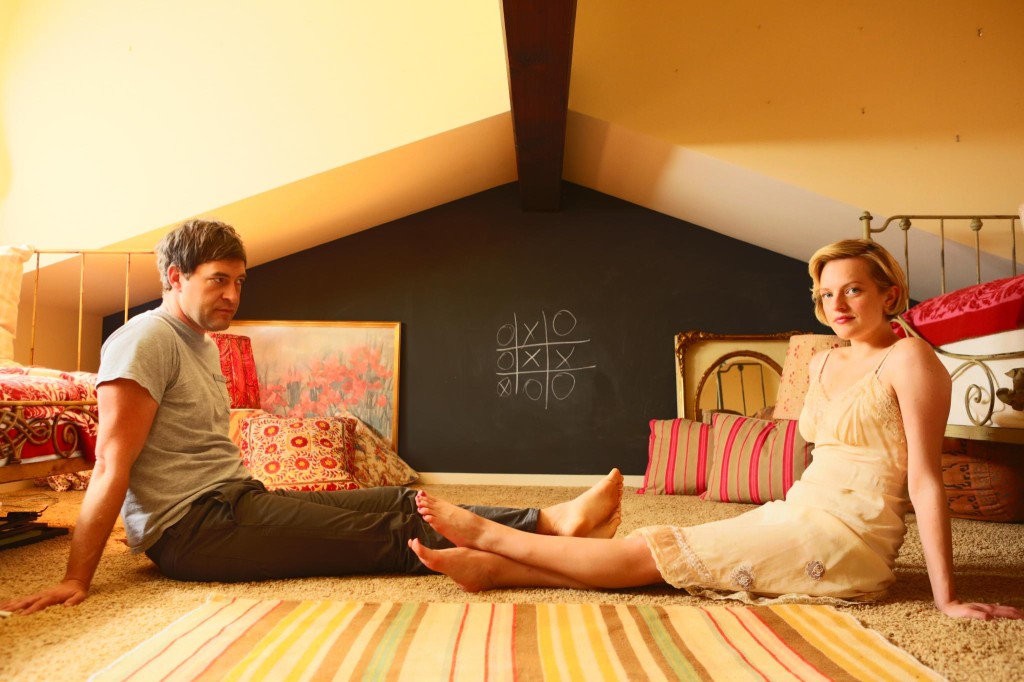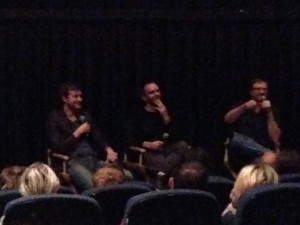
Mark Duplass and Elisabeth Moss in “The One I Love” (Image via)
A special screening of Sundance favorite, “The One I Love,” was offered at Landmark Century Centre Cinema Wednesday night, and a Q&A with director Charlie McDowell and co-star Mark Duplass immediately followed. The event was put together by The Dissolve in partnership with Pitchfork and was offered to a limited audience in anticipation of the film’s Aug. 22 release.
I won’t go into the plot of this movie, because it hinges upon a large twist early on. What I will say is that, in its most basic form, this movie is about a marriage in strife and the efforts to revive it. It centers around the theme of artiface and authenticity as it relates to one’s personality. As McDowell put it, we all give the best versions of ourselves in the beginning of a relationship — but that “shiny and new” version wears off.
I can tell you some of the reasons you should go see it, and discuss some of the non-spoilery points from the answers given by McDowell and Duplass. Beyond that, I advise you to read as little as you can about this movie (save for this post, naturally).
Writing Process and Character Development
Duplass told the audience he emailed a single line of the plot to McDowell, who took it from there, using limited sets and carefully, thoughtfully developed characters.
“I’m just the douche bag producer who says, ‘Make a movie out of that. And put me in it,’” joked Duplass.
McDowell said he and writer Justin Lader knew where they would be filming and wrote around the location available to them. They spent a lot of time creating extensive back stories for the film’s characters, but allowed for improvisation in terms of dialogue. In fact, co-star Elisabeth Moss, a friend of Duplass, agreed to do the film based on a 10-page outline she was given — sans dialogue.
“The actors met before each scene to improv where to go with it,” said McDowell. “They’d find it in a take and then adjust. This was [Moss’s] first time doing improv. She jumped in and was amazing.”
If Moss felt daunted in any way, it’s not conveyed on-screen. A friend also attending pointed out the wonderful chemistry between Moss and Duplass, which has a truly comfortable, worn-in feel.
Signalling Tonal Shifts
“The score helped create the tone of the movie,” said McDowell. “It told where the characters were emotionally. It’s a dramatic-feeling score, since [the actors] elevated the comedy.”
The film does an excellent job of melding genres, including drama and mystery, and the score moves right along with these with ease. McDowell compared it to the scores carrying both “Punch Drunk Love” and “Martha Marcy May Marlene,” and also added a nod to the use of music to set tone in “Eternal Sunshine of the Spotless Mind.”
“Tone was a big discussion,” said Duplass. “I can’t give enough credit to Charlie [McDowell] for balancing that and overseeing it. He curated all those elements. He could have made 10 different movies with [what was shot] and he made a conscious effort to make the movie exactly how we wanted it. You can’t make a movie like this in the studio system — they’d rub all the edges out of it.”
A Family Affair
McDowell said he’d worked as a PA for three seasons of Curb Your Enthusiasm but that this is his directorial debut. He pulled in people from his own life to help with the film, even enlisting his stepfather (Ted Danson) and mother (Mary Steenburgen) as actors.
The film was produced by Duplass and brother Jay. The two are known primarily for their work in the “mumblecore” film style, which relies heavily on improvised dialogue and loose plots.
McDowell said he wanted to make a small, low-budget film that felt cinematic and this story lent itself to that.
Again, Duplass stressed it’s best to go into this film blindly, if possible.
“The best way to go into it is knowing very little about it,” said Duplass. “With independent films, word-of-mouth is a very important thing.”
Go see this lovely, abstract movie. (Then text me so we can talk all about what I couldn’t write here.)
“The One I Love” opens tomorrow, Aug. 22 at the Music Box.




